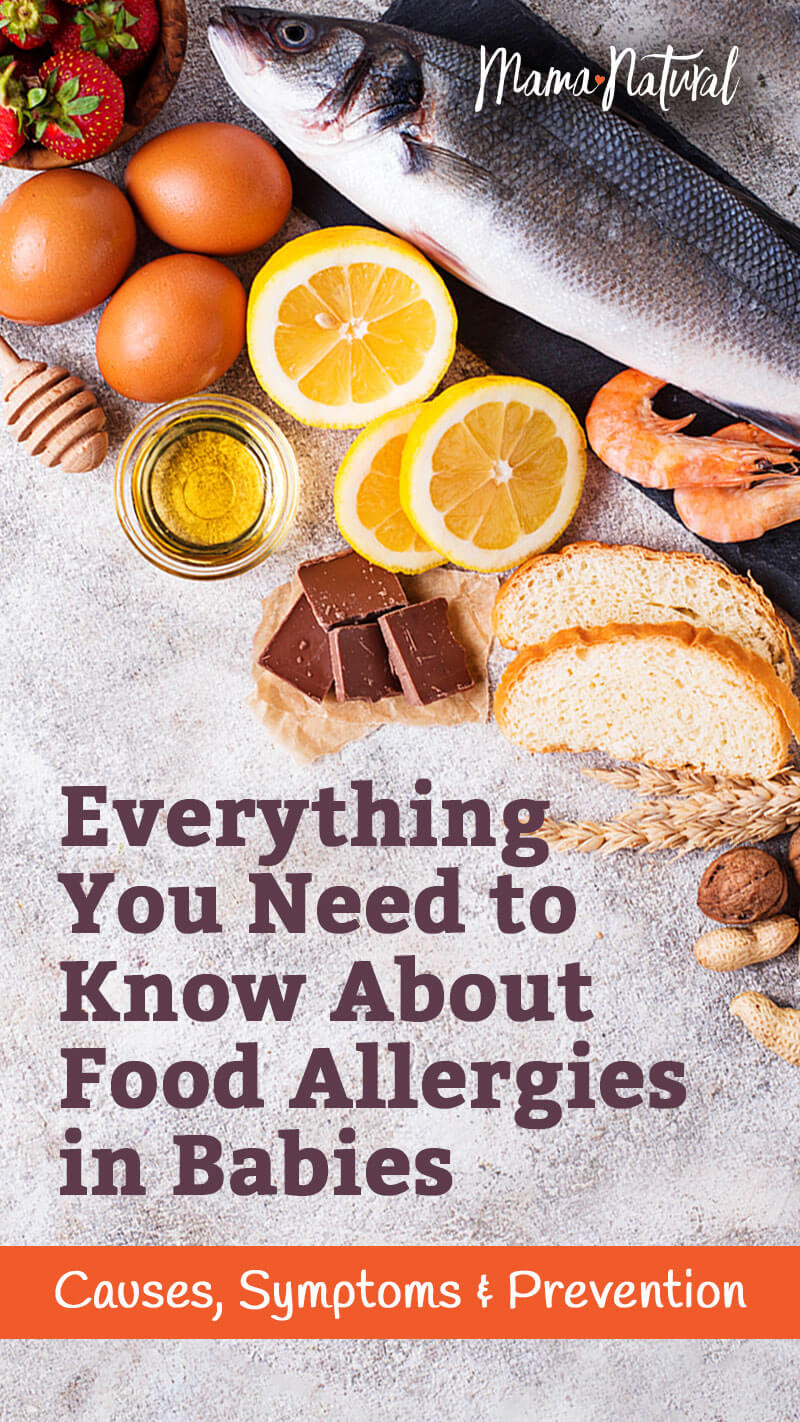How to Prevent Food Allergies in Babies During Pregnancy
Here are the summit 8 nutrient allergies in babies to watch out for, plus how to spot allergies in babies and how to prevent nutrient allergies in the first place.
When I was pregnant with Griffin eight years agone, the commonage advice was to avoid allergenic foods if y'all want to preclude your kid from having food allergies. Fast forward eight years afterward to my tertiary pregnancy, and the recommendation is the exact opposite.
So what gives?
New Research Regarding Nutrient Allergies in Babies
Well, it's not simply your imagination that information technology seems similar more kids have nutrient allergies these days.Researchers found these avoidance diets were actually increasing the incidences of food allergies in babies, peanut allergies in item.
There have been iii landmark studies in particular that not but offer promise, but have also prompted this huge change in the recommendations surrounding food allergies.
What the most recent research says about nutrient allergies in babies
- This written report showed thatintroducing peanuts/nut butter to at-risk babies before the historic period of 11 months dramatically reduces the take a chance of developing a peanut allergy up to 80 percent.
- Another report found that early introduction in addition to extended breastfeeding reduced the risk of developing an allergy.
- Researchers as well found that early introduction to hen's eggs reduced allergies by 79 percent.
The New Guidelines Surrounding Food Allergies in Babies
As a result of this, at that place's a whole new philosophy when information technology comes to food allergies in babies. The FDA, the National Institutes of Health, and the American Academy of Pediatrics have all updated their guidelines to support the science behind early and sustained allergen introduction.
- FDA: Recommends introducing highly allergenic nutrient, such equally peanuts, betwixt 4 and ten months.
- NIH: Suggests that babies betwixt the age of 4 and 6 months should have an "age-advisable" peanut source. (Read on to acquire more about historic period-advisable peanut sources.)
- AAP: Recommends introducing peanuts to high-gamble infants past the age of iv to 6 months. (High-risk infants have egg allergies and/or severe eczema.)
Annotation:Although many guidelines propose you tin can begin introducing allergens as early equally four months, in that location are plenty of reasons to wait until six months to do so. Read more than about when to introduce solids.
Get complimentary updates on baby's first twelvemonth! – Free Updates on First Year [In-article]
Sign me up!
How to Introduce Allergens
And so how exactly do you lot introduce allergens to babies?
Start with breastfeeding
Certain proteins in breastmilk tin can help preclude nutrient allergies in breastfed babies. In fact, a 2018 study revealed that mother's milk was able to reduce food-related anaphylaxis by helping the offspring tolerate the allergy. (source)
Get slow and steady
You need to innovate all eight of the nearly common allergens to baby, but you shouldn't innovate them all at one time. Why? If your babe does have a reaction to a certain nutrient, it's difficult to pinpoint which food caused the reaction. Wait at least 3 days betwixt introducing new foods.
Try a plan like Gear up, Fix, Food!
Consider using a program that can help you safely and finer introduce allergens. I recommend Ready, Set up, Food!, an allergist-developed system that allows you to gradually and gently introduce your babe (by mixing powder into chest milk or your infant's bottle) to peanuts, eggs, and cow's milk. It's a really simple style to do information technology—yous don't have to worry about whether you're introducing the correct amount or calculate your own timeline, since everything is pre-portioned and ready to go. You tin can read the full review hither.
Fix Gear up Food reduces the risk of developing food allergies by upwards to lxxx%
Continue exposure
After early introduction, the key is to proceed providing that food for at least iii to half dozen months. This is called sustained introduction, and it is just equally of import as the early on introduction itself.
Talk to your pediatrician
The studies all demonstrate that starting early is much more beneficial than waiting until xi or 12 months of age. Delaying introduction by this timeframe increases the risk of food allergies in babies. That said, no two babies are exactly the same, and your pediatrician can help y'all make up one's mind what's correct for your kid if you have whatsoever concerns.
How Nearly You?
Have you tried early introduction? What worked (and what didn't)? Have y'all tried a programme instead? Share your experiences below!

How to Prevent Food Allergies in Babies During Pregnancy
Source: https://www.mamanatural.com/food-allergies-in-babies/
0 Response to "How to Prevent Food Allergies in Babies During Pregnancy"
Post a Comment